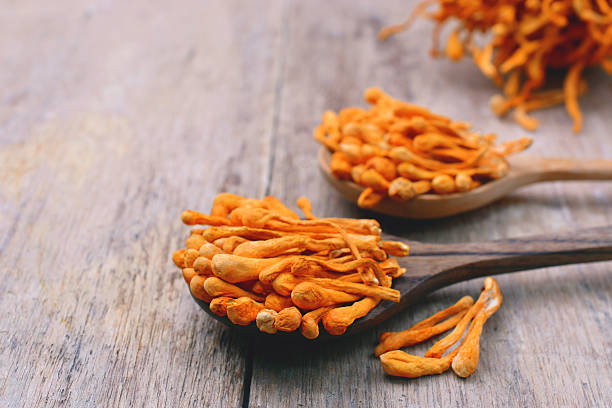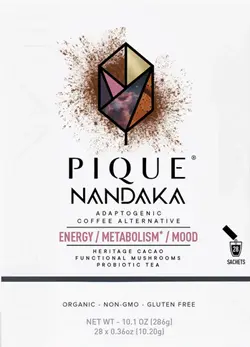This post contains affiliate links. Read my full diclosure HERE.

In recent years, mushroom coffee has surged in popularity as a trendy beverage, with claims of health benefits and a unique flavor profile. But amidst the buzz, a crucial question arises: Is mushroom coffee truly deserving of the attention it’s receiving? I’ve been intrigued to explore the world of mushroom coffee to uncover the truth behind the hype.
What is Mushroom Coffee?
Mushroom coffee, as the name suggests, is a blend of coffee and mushrooms. While the idea of adding fungi to your morning cup of joe might sound unusual, mushroom coffee has a long history, particularly in traditional medicine practices such as Ayurveda and traditional Chinese medicine.
The mushrooms commonly used in mushroom coffee blends include varieties like reishi, chaga, lion’s mane, and cordyceps, each prized for its purported health benefits.
Why Mushrooms?
Before exploring the specifics of mushroom coffee, it’s worth taking a moment to appreciate the remarkable organisms behind this emerging trend.
Mushrooms belong to the kingdom Fungi, a diverse group of organisms that play vital roles in ecosystems around the world. Unlike plants, which produce their own food through photosynthesis, fungi obtain nutrients through decomposition or symbiotic relationships with other organisms.
Mushrooms, in particular, are fascinating organisms with a range of unique attributes. Here are a few reasons why mushrooms are garnering attention in the world of wellness:
– Nutritional Density: Despite their humble appearance, mushrooms are surprisingly nutrient-dense, containing essential vitamins, minerals, and antioxidants.
– Medicinal Properties: Throughout history, mushrooms have been revered for their medicinal properties in various cultures around the world. Certain mushroom species, such as reishi, chaga, and lion’s mane, have been used in traditional medicine practices for centuries to promote health and wellbeing.
Modern research is beginning to uncover the scientific basis for these traditional uses, shedding light on the potential therapeutic benefits of mushrooms.
– Adaptogenic Abilities: Many mushrooms possess adaptogenic properties, meaning they can help the body adapt to stress and maintain balance. Adaptogens are a class of substances that support the body’s ability to cope with physical, emotional, and environmental stressors, promoting resilience and overall wellbeing.
By incorporating mushrooms into our diets, whether through culinary dishes or functional beverages like mushroom coffee, we not only enjoy their unique flavors and textures but also tap into their potential health-promoting properties.
As interest in holistic health and wellness continues to grow, mushrooms are emerging as a valuable ally in supporting our overall health and vitality.
The Hype Surrounding Mushroom Coffee
Popularity of mushroom coffee is fueled by claims of enhanced focus, improved immunity, and reduced stress. It is often presented as a superior alternative to traditional brews, containing less coffeine. But what lies behind the hype, and are these claims supported by science?

At the heart of mushroom coffee’s appeal are the mushrooms themselves, which are often heralded as potent sources of antioxidants, vitamins, and minerals. Additionally, many mushrooms used in mushroom coffee blends are classified as adaptogens, substances that help the body adapt to stress and maintain homeostasis. Research suggests that adaptogens may play a role in supporting the immune system, enhancing cognitive function, and reducing inflammation.
Most Commonly Used Mushrooms in Mushroom Coffee
Mushroom coffee owes much of its reputation and potential health benefits to the mushrooms it contains. There are different mushrooms used in mushroom coffee blends available on the market. The best known and commonly used are:
– Chaga (Inonotus obliquus) grow predominantly on birch trees in cold climates, such as those found in Siberia, Russia, and Canada. They have a black, charcoal-like appearance and a woody texture. Chaga mushrooms are rich in antioxidants, particularly a compound called betulinic acid. These antioxidants may help protect cells from oxidative damage, support immune function, and promote skin health. Chaga is also believed to have anti-inflammatory properties.
– Reishi (Ganoderma lucidum), also known as lingzhi mushrooms, have been revered for centuries in traditional Chinese medicine for their purported health-promoting properties. They have a distinctive fan-like or kidney-shaped cap and a glossy, reddish-brown exterior.
Reishi mushrooms are often hailed as the “king of mushrooms” due to their potential immune-boosting effects. They contain bioactive compounds called triterpenes and polysaccharides, which may support immune function, reduce inflammation, and promote overall wellbeing.
– Lion’s Mane (Hericium erinaceus) mushrooms are named for their shaggy appearance, which resembles a lion’s mane. They have cascading white spines and are typically found growing on hardwood trees. Lion’s Mane mushrooms are prized for their potential cognitive-enhancing effects. They contain compounds called hericenones and erinacines, which may stimulate nerve growth factor (NGF) production in the brain, leading to improved cognitive function, memory, and focus.
– Turkey Tail (Trametes versicolor) mushrooms derive their name from their colorful, banded appearance, which resembles the tail feathers of a turkey. They are commonly found growing on decaying logs and tree stumps. Turkey Tail mushrooms are rich in polysaccharides known as beta-glucans, which have been studied for their immune-modulating effects. Research suggests that turkey tail mushrooms may support immune function and help the body fight off infections and illnesses.

– Cordyceps (Cordyceps sinensis) are unique in that they are parasitic fungi that infect insects and arthropods. The fruiting body of the mushroom emerges from the host insect’s body, forming elongated, club-shaped structures.
Cordyceps mushrooms are often lauded for their potential energy-boosting and endurance-enhancing properties. They contain adenosine, a compound that may support cellular energy production, as well as cordycepin, which may help improve exercise performance and oxygen utilization.
How to Choose and Incorporate Mushroom Coffee into Your Routine
Incorporating mushroom coffee nowadays is easier than ever. Powder forms are available and easy to use on a daily basis; just experiment with different blends and brewing methods to find the perfect cup to suit your tastes and preferences.

I’ve been testing both options, from pre-made blends to DIY recipes, such as my Healthy Cacao where a would add some medicinal mushrooms to the recipe.
While shopping for mushroom coffee, there are many brands, but the important points I was considering when choosing were:
♦ opting for certified organic and non-GMO coffee beans and mushroom components whenever possible to help ensure safe ingredients
♦ choosing coffee brands that use a “dual extraction” method to extract the most health-promoting substances from the mushrooms and
♦ no sugar, fillers, or flavors
My top two favorites are Four Sigmatic and Pique Nandaka in terms of taste and quality. PIQUE made it even more convenient with separate, one serving bags I use while traveling. They are organic, vegan, non-GMO, with no added sugar, preservatives or artificial ingredients.
Health Benefits of Mushroom Coffee
These drinks taste pretty similar to regular coffee, so you won’t miss your joy, and on top of that, you will have some potential benefits. Depending on the mushroom type used and your own goals, mushroom coffee could:
- improve and strengthen your immune system
- reduce stress
- support memory
- reduce inflammation
- increase energy levels
- help you sleep better
Anecdotal evidence abounds regarding the benefits of mushroom coffee, with reports of improved energy levels, mental clarity, and overall wellbeing. It’s essential to balance anecdotal evidence with scientific research to form a well-rounded understanding of mushroom coffee’s potential effects.
While mushroom coffee holds promise as a functional beverage, it’s not without a few potential drawbacks and considerations. There is a possibility of allergic reactions to certain mushroom species or interactions with medications. Depending on your own condition, it’s crucial to consult with a healthcare professional before incorporating mushroom coffee into your routine.
Conclusion
So, is mushroom coffee worth the hype?
Overall, incorporating these mushrooms into mushroom coffee blends offers a convenient and enjoyable way to harness their potential health benefits.
By synergistically combining these mushrooms with coffee, there is hope to create a functional beverage that supports immune function, enhances cognitive performance, and promotes overall wellbeing.
While more research is needed to fully understand the mechanisms underlying these health benefits, the centuries-old tradition of using mushrooms for wellness suggests that there may be valuable insights to be gained from further exploration.
Let's connect
Sign Up for news and special offers
+ get our FREE guide!
Thank you!
You have successfully joined our subscriber list.
Check your email!



